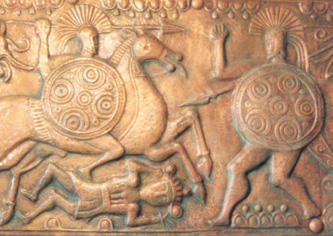erez87
Lord of Random
- Joined
- May 16, 2002
- Messages
- 13,500
Portugala
Portugala
Ruler/Player: Luthern Dynesty
Age: Bronze Age
Government: Monarchy
Category: p. 4, e. 6, s. 6
Religion: Iberian Polytheism
Economy: Growing
Army: 1,000 spearmen, 1,000 archers
Navy: 10 galleys
Education: Lost Cause
Culture: Barbaric
UU:
Wonders:
He was a young men when he and his two sons built the Lisbonian mansion for their familiy on the coast near a river in the lands of Lusitania. After the mansion was complete the whole familiy moved into the areas with all their slaves and people. Soon after other people came into the growing village and built their homes. The Lisbonian Mansion became where the leadership of the village, Luthern familiy and elders from other families in the village, came togheter to discuss the future of the village. It didn't took time until Iberian barbarians came to threat the village of the Luthern Lusitanians. The first wave of Iberians sacked the village as they raped many of the women and killed many of the men. The Luthern family tried to create soem miliatry but it wasn't enough. Luthern himself was killed by the Iberians that took over the village. The village was ruined.
Luthern two sons signed peace with the Iberians that now ruled the city but with the rest of the citizens they always planned when to break away from the Iberians. They created a milita after the Iberians agreed and never stopped growing it. In the end they had more than thousand men. The battle over Lisbon mansion begun with a victory for the Lusitanians. What was left of them. Many of the families were already a merge of Lusitanians and Iberians, but all were bounded into one faith against Iberia and so no one opposed the rebellion. Soon the rebellion won against the Iberians and pushed them away of Lisbon. Hearing of the victory many Lusitanian-Iberian people settled in the growing city as well and in villages around it. No longer being Lusitanians nor Iberians made the people call for a new name. They were called Portuguss. The people of Portugala. In the battles against the Iberians one of the sons died and so the other decleared hismelf king of Lisbon and of Portugala. All followed him. The next Iberian assult was easily crashed and no more assults ever came after. portugala was finaly free.
After freedom came the need for expansion. Portugala population was growing more and more. More room was needed for it. For that the King of those days decided a war of expansion against Iberia cannot work, and so Portugala must find other ways to expand...
ORDERS
Kill 1 economy
use 4 sp on navy.
use 2 on education.
Portugala
Ruler/Player: Luthern Dynesty
Age: Bronze Age
Government: Monarchy
Category: p. 4, e. 6, s. 6
Religion: Iberian Polytheism
Economy: Growing
Army: 1,000 spearmen, 1,000 archers
Navy: 10 galleys
Education: Lost Cause
Culture: Barbaric
UU:
Wonders:
He was a young men when he and his two sons built the Lisbonian mansion for their familiy on the coast near a river in the lands of Lusitania. After the mansion was complete the whole familiy moved into the areas with all their slaves and people. Soon after other people came into the growing village and built their homes. The Lisbonian Mansion became where the leadership of the village, Luthern familiy and elders from other families in the village, came togheter to discuss the future of the village. It didn't took time until Iberian barbarians came to threat the village of the Luthern Lusitanians. The first wave of Iberians sacked the village as they raped many of the women and killed many of the men. The Luthern family tried to create soem miliatry but it wasn't enough. Luthern himself was killed by the Iberians that took over the village. The village was ruined.
Luthern two sons signed peace with the Iberians that now ruled the city but with the rest of the citizens they always planned when to break away from the Iberians. They created a milita after the Iberians agreed and never stopped growing it. In the end they had more than thousand men. The battle over Lisbon mansion begun with a victory for the Lusitanians. What was left of them. Many of the families were already a merge of Lusitanians and Iberians, but all were bounded into one faith against Iberia and so no one opposed the rebellion. Soon the rebellion won against the Iberians and pushed them away of Lisbon. Hearing of the victory many Lusitanian-Iberian people settled in the growing city as well and in villages around it. No longer being Lusitanians nor Iberians made the people call for a new name. They were called Portuguss. The people of Portugala. In the battles against the Iberians one of the sons died and so the other decleared hismelf king of Lisbon and of Portugala. All followed him. The next Iberian assult was easily crashed and no more assults ever came after. portugala was finaly free.
After freedom came the need for expansion. Portugala population was growing more and more. More room was needed for it. For that the King of those days decided a war of expansion against Iberia cannot work, and so Portugala must find other ways to expand...
ORDERS
Kill 1 economy
use 4 sp on navy.
use 2 on education.





